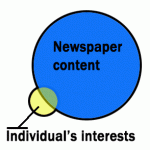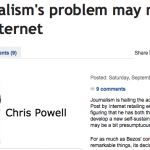Online Journalism Archive
15 Oct 2013
7-year-old advice about online journalism, surprisingly still true

Back when I was an editor in a business section, December and January brought the annual ritual of predictions from economic experts. I tried to make sure that each of our stories also went back and looked at the experts’ year-old forecasts. Turnabout is fair play. So here’s an article I wrote in 2006 for
11 Oct 2013
Editors seem to forget that news photographers can write, too

I was going to write today about Bill Marimow’s dramatic ouster from the editorship of the Philadelphia Inquirer. But then I came across an item concerning people who are probably much less comfortably situated to cope with job loss than Marimow, and much less likely to have high-powered lawyers suing to bring them back. According
09 Oct 2013
Why stories full of holes end up in print and online

Jim Romenesko drew the journosphere’s attention yesterday to a note from The Oklahoman’s publisher, apologizing for a recent story about a couple of politicians. Not that anything in the story was false, the publisher wrote, but its “placement on the front page of Sunday’s edition did not comport with the worthiness of the story.” We
08 Oct 2013
To boldly go where no reader has gone before

If we’re going to Save Journalism, it will be helpful to figure out exactly what we’re trying to save. I was reminded of one of the key elements when listening to a recent episode of “This American Life.” Michael Lewis reported on … a man named Emir Kamenica, whose path to college started with fleeing
05 Oct 2013
In defense of viral bullshit (sort of)

Follow the bouncing meme: T-shirt seller FCKH8 posts a photo it says it got from a supporter, supposedly of a man’s letter to his daughter, disowning her for disowning her gay son. Photo of letter starts to go viral, triggering post by Gawker. In comments underneath, Gawker owner Nick Denton and editor John Cook disagree
03 Oct 2013
Why news is a fungible commodity, and why that matters

News is a fungible commodity. That is to say: News of the sort provided by daily metro newspapers consists in large part of information that readers can easily replace with similar or identical information obtained elsewhere. This has dire implications for many of the models for saving newspapers. Let’s look at a common counterargument: Newspapers
02 Oct 2013
On Chris Powell, blaming customers, and newspapers’ mission from God

Chris Powell, managing editor (at least for now) of the Journal Inquirer in Connecticut, says illiterate, immoral, indigent single parents are killing newspapers. He’s not 100% wrong. Sure, as Slate’s Amanda Hess points out, his facts are wrong. And the contempt Powell packs into one sentence does tend to suggest sour grapes: But newspapers cannot
27 Sep 2013
Steal this idea: An interactive sports Believe-O-Meter

I can’t take all the credit for the Cleveland Indians’ remarkable late-season playoff run; I’m sure their players and coaches had a little to do with it. But I’m sure that they were inspired by a desire to boost the team’s rating on The Plain Dealer/cleveland.com Believe-O-Meter: The story of the meter, in brief: For
25 Sep 2013
The case for online comments

Popular Science shuts off comments on its website; cue the Comment Wars again. I can’t help myself. So: my counterarguments to the comment critics. (The executive summary: The problem with online comments isn’t the commenters. The problem is lazy, cheap, cowardly or clueless site bosses.) People say nasty things in comments People say nasty things
20 Sep 2013
7 common pitfalls of newspaper narratives

I spent the last few days reading over many pieces of narrative non-fiction, to talk to a creative writing workshop about the mutually parasitic relationship between literature and journalism. I found myself stumbling over the same things, mostly in newspaper narratives. 1. Dialogues with the unseen, unheard extra character You’re used to filtering your interviews
